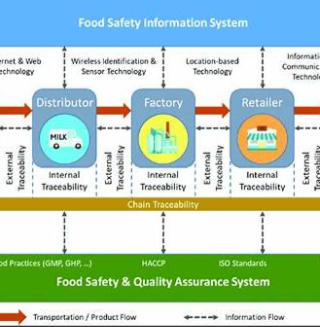The Food Safety Modernization Act (FSMA) revolutionized food safety in the United States, aiming to proactively prevent foodborne illnesses rather than simply responding to outbreaks. Electronic Data Interchange (EDI) plays a crucial role in helping organizations achieve FSMA compliance, streamline data management, and maintain rigorous standards across the food supply chain. Let’s explore how FSMA and EDI intersect to improve food safety and operational efficiency.
EDI’s Role in FSMA Compliance
EDI simplifies compliance with FSMA by ensuring accurate, timely, and standardized data exchange between food manufacturers, suppliers, distributors, and regulatory bodies. EDI automates the transmission of essential information such as traceability records, quality certifications, shipping notices, and inspection reports, significantly reducing manual errors and improving reliability.
Enhanced Traceability and Transparency

One of FSMA’s central pillars is robust traceability. EDI systems facilitate rapid, accurate tracking of food products from origin to consumer, enabling quick response to food safety issues. Real-time visibility ensures immediate identification of contaminated products, minimizing health risks and economic impact.
Automation and Efficiency
By automating critical data exchanges related to FSMA requirements, EDI reduces administrative burdens and improves operational efficiency. Automation decreases paperwork, lowers labor costs, and allows businesses to respond swiftly to regulatory demands, audits, or recalls.
Improved Data Accuracy
EDI dramatically reduces the risk of human error associated with manual data entry. Automated data verification ensures high accuracy, which is essential for maintaining compliance with FSMA’s rigorous documentation requirements.
Data Security and Compliance
Secure data transmission is essential to FSMA compliance. Modern EDI solutions incorporate advanced security measures such as encryption, secure authentication protocols, and detailed audit trails, ensuring sensitive food safety information is protected against breaches or unauthorized access.
Real-time Regulatory Updates
EDI platforms offer timely regulatory updates, ensuring businesses remain compliant with FSMA’s evolving requirements. Companies using advanced EDI systems benefit from automatic alerts and seamless updates, keeping them consistently aligned with regulatory changes.
Sustainability and Digital Transformation
EDI aligns with broader sustainability initiatives within the food industry by reducing paper usage and promoting digital record-keeping. Transitioning to paperless operations supports eco-friendly practices, demonstrating a commitment to sustainability.
Conclusion
Integrating EDI with FSMA compliance provides substantial benefits, including enhanced food safety, increased operational efficiency, and robust data security. Organizations leveraging EDI to meet FSMA standards will be better equipped to navigate regulatory complexities, ensuring safer food products and stronger industry-wide practices.
Need Help with Electronic Data Interchange
If you need help with EDI, Integration, Inc. is here to help. We specialize in outsourcing and automation solutions, including electronic data interchange services, check printing & mailing, and rebate processing. Our team stays current with the latest EDI trends, ensuring your business operates efficiently in today’s fast-paced environment.
Contact us today to learn how our EDI services can streamline your operations. Let Integration, Inc. help you stay competitive in 2025 and beyond.
Similar Posts
Ready to discuss your EDI or BPO needs?
Our team can’t wait to talk to you about your business's unique needs so we can provide a solution quickly and cost effectively.
Let’s talk today